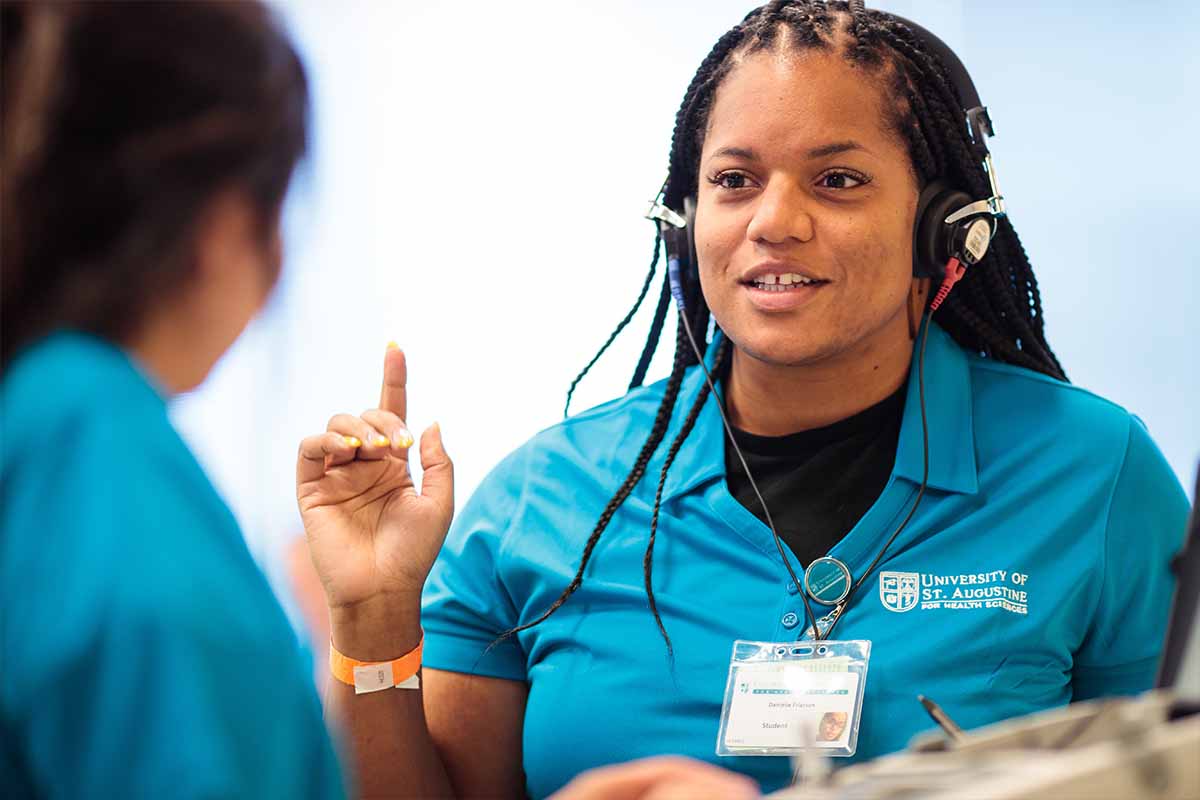
By Kathy Wheat, PhD, CCC-SLP, Program Director of USAHS’s Master of Science in Speech-Language Pathology program
Speech-language pathology (SLP) is one of the fastest-growing professions today. And with a master’s degree in the field, you can work as a speech therapist in a variety of interesting settings—hospitals, outpatient rehab, schools, private practice, guidance centers, home health, and more.
I have worked in almost all settings over my 20+-year career. I enjoyed each experience and learned a tremendous amount in every role. I tell students that the field of SLP will be challenging and rewarding and that their options of populations and settings will enable them to be lifelong learners. Students in a graduate SLP program often focus on an initial area of interest in their academic programs; however, many practitioners find that their areas and populations of interest change over time.
There are also opportunities for leadership and management with an SLP degree. My background includes administration, supervision, education, and training. Other SLPs may own private practices and learn additional business skills for their success.
USAHS’s MS-SLP Program
At USAHS, students in the Master of Science in Speech-Language Pathology (MS-SLP) program join a collaborative cohort of engaged peers. They are personally mentored by expert faculty-practitioners who have clinical experience and advanced degrees in the field. Students typically complete their academic coursework online, participate in residency weeks on campus each trimester, and complete hands-on practica in school and clinical settings.
The entire MS-SLP program is five trimesters, with four trimesters featuring a four- to five-day clinical residency experience. In the first-trimester residency experience, students learn to conduct speech-language and hearing screenings with participants and may complete assessment and treatment encounters. For subsequent trimesters, clinical residency and externship experiences include working with preschool and school-age children, specialty populations, and external placements in healthcare, private practice, or school settings. Coursework precedes clinical experiences, so that students apply their knowledge within their on-campus immersion experiences and externships. Some of their clinical experiences are interprofessional, giving our students practice working on teams with their peers in other healthcare disciplines.
Pivoting in a Pandemic
When in spring 2020 the COVID-19 pandemic necessitated a move to virtual learning, we were able to quickly pivot in a way that not many universities could, moving our residency weeks and practica online.
So that graduating students could get the practicum hours they needed on time, faculty developed a virtual community clinic where SLP students work with clinical educators and clients with speech-language issues from across the state of Texas, delivering treatments via telehealth. This turned into a great opportunity for our students to practice using telehealth, which was a fast-growing modality for speech-language pathologists even before the pandemic. With telehealth, SLPs are using online technology to provide services to schools and healthcare facilities to meet the needs of patients, sometimes across state lines. Rural areas benefit greatly from this service delivery, as shortages of speech therapists and services remain high.
We are constantly evolving our curriculum to stay at the forefront of technology. In our state-of-the-art clinical simulation centers on the Austin and Dallas campuses, students have the chance to practice diagnostics on mock patients—and each other—with two different types of endoscopes.
While the MS-SLP program is geared toward students who have a bachelor’s degree in communication sciences and disorders (CSD) or speech-language pathology (SLP), students with a bachelor’s degree in another field may also apply. Students who come to us with degrees other than CSD or SLP may take leveling (pre-requisite) courses in the sciences and the discipline before applying. Leveling courses in the discipline provide foundational SLP learning that is needed for the master’s degree program.
Given the persistent shortages of SLPs and the limited opportunities in other graduate degree programs, I am excited that our program offers a virtual pathway to practice during these extraordinary times. Our robust and rigorous MS-SLP program prepares students to be highly competitive candidates—as well as knowledgeable, empathetic, and ethical practitioners.
The University of St. Augustine for Health Sciences (USAHS) offers a Master of Science in Speech-Language Pathology (MS-SLP). Designed for working students, the MS-SLP is an online program with four required on-campus residencies on either the USAHS Austin or Dallas campus. The program offers two intakes per year, in January and September. Prepare to make a difference in the lives of clients across the lifespan with a meaningful career in speech therapy!
The Master of Science in Speech-Language Pathology education program at the University of St. Augustine for Health Sciences is a Candidate of Accreditation by the Council on Academic Accreditation in Audiology and Speech-Language Pathology (CAA) of the American Speech-Language-Hearing Association, 2200 Research Boulevard, #310, Rockville, MD 20850, 800-498-2071 or 301-296-5700. Candidacy is a “preaccreditation” status with the CAA, awarded to developing or emerging programs for a maximum period of 5 years.
For students with a bachelor’s degree in a field other than communications sciences and disorders (CSD) or SLP, we offer SLP leveling courses for completing the necessary pre-requisites to enter the graduate program.









